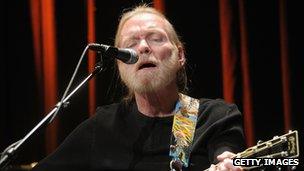Robert Redford: Film industry benefits economy
- Published
Robert Redford tells Charlie Stayt how he has tried to recreate ''the experience of seeing films''
The film industry should get more credit for the contribution it makes to the wider economy, according to the US actor and director Robert Redford.
"Someone needs to step forward and talk about the economic benefits that films bring," he said at the launch of the second Sundance London Film Festival.
Film, he said, "brings billions to the table and that should be made clear".
Earlier, UK Culture Secretary Maria Miller told arts executives to "hammer home" the economic case for culture.
She said: "When times are tough and money is tight, our focus must be on culture's economic impact."
Asked to comment on her remarks, Redford said the film industry's existence brought economic benefits that should receive more recognition.
The film industry, he said, gave work to "people who not only work in film, who make the films... but [also] people who work to display the films in theatres".
The UK film industry contributed more than £4.6bn to the British economy in 2011, according to a report, external published in September.
The industry also sustained more than 117,000 jobs, while tourism generated by films depicting the UK was thought to have contributed about £1bn, it said.
Redford has returned to the capital for the second London offshoot of his Utah film festival. The London event runs from 25 to 28 April at the O2 complex in Greenwich.
This year's programme features a range of independent titles from both the US and the UK as well as live performances from Canadian singer Peaches and others.
Also on the bill is Gregg Allman of the Allman Brothers Band, who will appear with John Paul White of country duo The Civil Wars at an event to tie in with music documentary Muscle Shoals.
The film takes its name from the small Alabama town whose studios made it a key destination for some of the biggest music acts of the 1960s and '70s.
The second Sundance London, said Redford, would continue Sundance's support for independent film, a sector whose financial stability "has always been and will continue to be difficult" to maintain.

Gregg Allman is among the US musicians who will perform at Sundance London this year
"Independent film has always had to struggle for a place in the universe," he said, calling for extra funding to aid the exhibition and distribution of non-mainstream titles.
His views were endorsed by Sundance Film Festival director John Cooper, who called for "more subsidies... to help film-makers in that last stage so that they can reach audiences".
The Sundance Institute, of which Redford is president, takes its name from the character he played in one of his most famous films, 1969 western Butch Cassidy and the Sundance Kid.
He is also known for his roles in All the President's Men and The Way We Were and for directing the 1980 Oscar-winner Ordinary People.
Redford will be seen at the Cannes Film Festival in May in survival drama All Is Lost and in UK cinemas in June in political thriller The Company You Keep.
- Published24 April 2013
- Published11 March 2013
- Published26 April 2012